Wings of Hope for Pancreatic Cancer Research
March 2025
Vermont marijuana business raises funds for Colorado’s Wings of Hope for Pancreatic Cancer Research
February 2025
CU CENTER FOR DRUG DISCOVERY

Thank you to Dr. Flaig, Vice Chancellor for Research, and Dr. Dan LaBarbera, Co-Director of the Center, for the extensive tour of the amazing CU Center for Drug Discovery. The Center is the only facility of its kind in the central U.S. focused solely on reducing the time and cost of screening new drugs and therapies. Powered with an automated robotic system that allows screening time to be cut in half, the Center has a diverse drug library of 125,000 compounds as well as biologic and cell-based therapies. One more amazing component at the CU Cancer Center making a difference in research discoveries.
NOVEMBER 2024
DENVER CITY & COUNCIL BUILDING BATHED IN PURPLE FOR PANCREATIC CANCER AWARENESS MONTH



NOVEMBER 2023
IN SUPPORT OF NOVEMBER BEING PANCREATIC CANCER AWARENESS MONTH COLORADO GOVERNOR JARED POLIS ISSUES PROCLAMATION

August 2023
RADIATION-IMMUNOTHERAPY STRATEGY FUNDED BY WINGS OF HOPE SHOWING GREAT PROMISE IN EARLY RESEARCH STAGE
Thank you to Dr. Sana Karam and her team for pursuing this novel approach to eradicate pancreatic cancer tumors. WINGS OF HOPE is committed to funding those novel seed research projects that show promise in the treatment and eradication of pancreatic cancer. RADIATION-IMMUNOTHERAPY STRATEGY FUNDED BY WINGS OF HOPE SHOWING GREAT PROMISE IN EARLY RESEARCH STAGE
July 2023
WINGS OF HOPE 2023 IMPACT STATEMENT
Read the tremendous strides being made in pancreatic cancer at the University of Colorado Cancer Center as a result of WINGS OF HOPE. To date WINGS OF HOPE has raised more than $1.6 million, all going directly toward raising awareness and funding for pancreatic cancer research. None of this would be possible without the tremendous and generous support of so many, for whom we are grateful and thank wholeheartedly. Maureen Shul / Wings of Hope 2023 Impact Report
June 2023
Research on using radiation to trigger a pancreatic cancer immune response earns peer review
Please click on link to read the full article. Study at CU Cancer Center sponsored by Wings of Hope for Pancreatic Cancer Research
May 2023
WINGS OF HOPE HELPS FUND NEW TREATMENT THAT CAN ERADICATE PANCREATIC CANCER TUMORS WHILE STOPPING CANCER PROGRESSION
Please click on link to read the full article. Unique treatment can eradicate pancreatic tumors while stopping cancer progression
March 2, 2023
2022 WINGS OF HOPE FOR PANCREATIC CANCER
RESEARCH GRANTS ARE ALREADY AT WORK
Please click on link to read the full article. 2022 Wings of Hope for Pancreatic Cancer Research grants are already at work
COLORADO GIVES DAY
THANK YOU FOR YOUR SUPPORT!
On December 7, 2021 more than 3,000 local non profit organizations benefited from donations received from those who support and believe in their cause. THANK YOU to everyone who made a donation to WINGS OF HOPE FOR PANCREATIC CANCER RESEARCH on that day. Your support is making a difference in funding pancreatic cancer research at the University of Colorado Cancer Center. THANK YOU!

February 2022
Wings of Hope for Pancreatic Cancer Research awards record-breaking grants for 2022
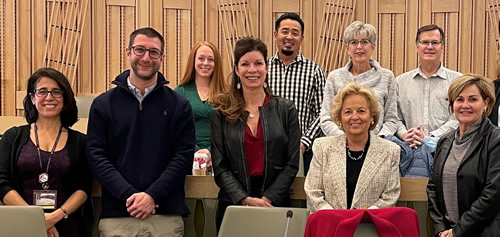
Left to right: Dr. Sana Karam, Dr. Carlo Marchetti, Allison Krebs, Kathryn Haber, Colin Daugherty, Cathy Noon (back), Maureen Shul (front), Jim Noon, Ann Adams
For more go to Events page
February 2022
King Soopers Community Rewards Program

WINGS OF HOPE is proud to be a part of the King Soopers Community Rewards Program. To support WINGS OF HOPE with every King Soopers purchase you make is easy with your King Soopers Loyalty Card. Just go to www.KingSoopers.com, click on Community Rewards, find WINGS OF HOPE (page #1119), and click on Enroll. Your Loyalty Card is now linked to WINGS OF HOPE. If you do not have a Loyalty Card, you can easily obtain one at any King Soopers or City Market store. Thank you King Soopers for giving back to the community, and all of YOU for your support of WINGS OF HOPE.
February 2022
THE HAROLD AND CECILE COHAN PANCREATIC CANCER RESEARCH FUND
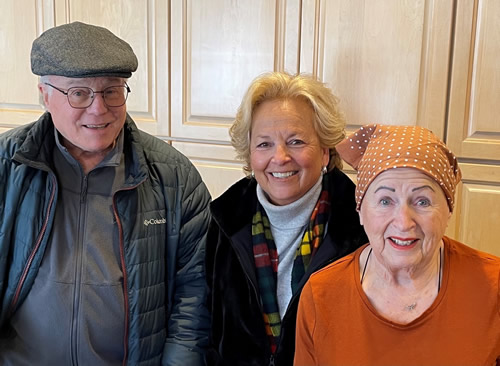
Larry Tepper, WINGS OF HOPE founder Maureen Shul, CeCe Cohan
Sincerest thanks and appreciation to Cecile Cohan for her tremendously generous support. Cecile (CeCe) was introduced to and attended WINGS OF HOPE events through Larry Tepper, who lost his wife to pancreatic cancer. As a result of what she learned from attending the annual “Evening of Hope” benefit, CeCe realized the impact being made by WINGS OF HOPE funding pancreatic cancer research at the University of Colorado Cancer Center. It was her deceased husband’s desire that his wife specify his trust’s use in a medical purpose. With that foremost in her mind, an amendment was officially made a part of Harold Cohan’s Trust specifying $333,333.33 go directly toward pancreatic cancer research at the CU Cancer Center in the form of a matching gift. This significant and generous gift will have an incredible impact in moving the critically needed research forward.
February 2022
Wings of Hope for Pancreatic Cancer Research awards record-breaking grants for 2022
$350,000 in research funds will support clinical trials into new pathways to fight the disease

Left to right: Dr. Sana Karam, Dr. Carlo Marchetti, Allison Krebs, Kathryn Haber, Colin Daugherty, Cathy Noon (back), Maureen Shul (front), Jim Noon, Ann Adams
Wings of Hope for Pancreatic Cancer Research has given two milestone grants for 2022, totaling $350,000—more than double what the organization typically awards annually.
“That’s an unusual amount that Wings of Hope is able to give, and we’re thrilled that we’re able to do that through the generosity of our donors. There continues to be an urgent need for more clinical trials that lead to more effective treatments,” said Cathy Noon, a pancreatic cancer survivor, a former Centennial mayor and an advisor to the organization’s grant process.
The two record-breaking grants were made possible by the generous ongoing support of the community—even though Wings of Hope’s fundraising efforts and grant process were halted last year in the face of the ongoing Covid-19 pandemic.
“While a handful of us participated in the grant-selection process, just as present were the loved ones we have lost to this brutal disease and the many whose continual and generous support made this milestone grant amount possible,” said executive director Maureen Shul, who founded Wings of Hope after losing her mother and brother to pancreatic cancer.
Both of the newly funded trials will begin this year in Aurora at the University of Colorado Cancer Center on the Anschutz Medical Campus, where Wings of Hope is a chief financial supporter of the center’s ongoing research into one of the deadliest and most difficult-to-treat cancers. The first clinical trial will look into how a drug called ASO might help combat STAT3, a gene that effectively protects cancer cells and is believed to be a major factor in the ongoing challenges of treating pancreatic cancer.
“The bad immune cells use STAT3 to make more of themselves. Cancer cells have a boatload of STAT3. It was a matter of finding a good drug and a good context where it works,” explained Dr. Sana Karam, the CU radiation oncologist who will lead the clinical trial. Karam hopes a mix of ASO and targeted radiation may be the ticket to a positive outcome for the 40 or so patients with advanced pancreatic cancer who will participate in the human trials.
“We’re going to give the drug for one week. Then we’re going to give the combination of the drug and radiation for one week. We’ll continue the drug for an additional two weeks. Then we’re going to do scans on the patients and monitor them for disease regression,” said Karam, who has already conducted a similar trial with mice. “This combination has not yet been used in humans.”
The human trials will include tests for both safety and efficacy.
The second clinical trial will similarly look at another biological “enemy” in the fight against pancreatic cancer. Dr. Carlo Marchetti, a CU research professor, will be taking a close look at a protein called NLRP3, which seems to hasten the spread of pancreatic cancer by suppressing the cells that might otherwise kill the cancer. Hopes are that a synthetic molecule called Dapansutrile—used to treat heart failure and gout—will be a formidable foe to the killer protein.
“We plan to give this molecule to mice and see if we can reduce tumor progress,” Marchetti said. “Blocking the NLRP3 function, we believe, will reflect in increased ability of the body to fight the cancer cells. We think the pancreatic cells induce the production of this protein.” Marchetti says the mice trial is an important early step in the longer process to understand the exact role of NLRP3 in the proliferation of pancreatic cancer.
“If the study is successful, it’s going to create the rationale to develop this program further,” he said. “Hopefully, one day we’ll be able to treat patients with this.”
Researchers stress the importance of the seed money from Wings of Hope in getting early trials such as these off the ground, potentially opening the way later for larger funding if the early trials show promise. That is especially true for the latest step in the ongoing STAT3 research.
“This work has taken years with a lot of people involved,” Karam said. “It could not have been done without the support of Wings of Hope. We were able to take it from stem-cell lines growing in a dish to animals and now finally to humans. It’s pretty exciting.”
January 2020
University of Colorado Cancer Center named National Pancreas Foundation Center of Excellence
MAY 2019
INAUGURAL CU CANCER CENTER ROUNDTABLE LUNCHEON
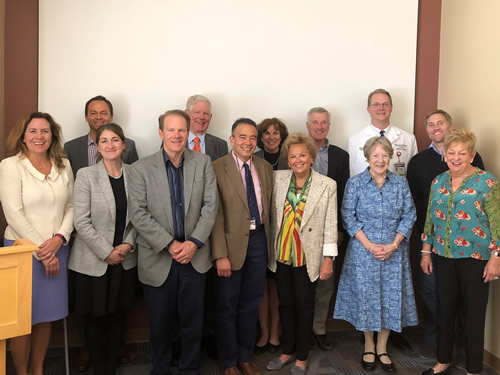
Dr. Richard Schulick (front row center),staff and members of the Cancer Center Roundtable
Director of the University of Colorado Cancer Center Dr. Richard Schulick hosted the first CU Cancer Center Roundtable, inviting those advocates and leaders who are helping accelerate bringing leading edge research to patient care. Providing the group with the latest updates on cancer research at the CU Cancer Center, Dr. Schulick expressed that lives are being improved and saved through the support provided by this group. WINGS OF HOPE founder|CEO Maureen Shul stated, “It was an honor to be invited to the Roundtable and learn first hand the incredible strides being made right here in cancer research.”
February 2019
Wings of Hope for Pancreatic Cancer Research awards groundbreaking grants at CU Cancer Center
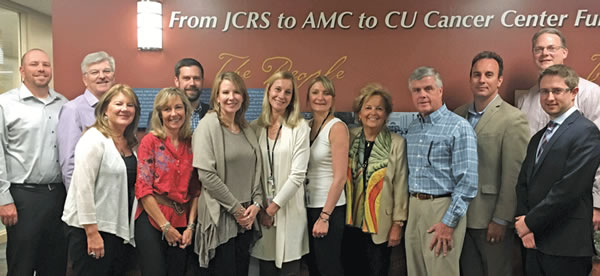
Local doctors and clinicians looking for new ways to fight one of the deadliest of cancers
BY PETER JONES
SPECIAL TO WINGS OF HOPE
There is finally both bad news—and good news—about pancreatic cancer.
The bad news is hardly new: Research into the often deadly cancer of the pancreas continues to wallow at about where breast cancer research was when Jimmy Carter was in the White House.
But research is slowly, but surely, catching up—and much of the groundbreaking work is happening on the Anschutz Medical Campus at the University of Colorado Health Sciences Center, thanks to Wings of Hope for Pancreatic Cancer Research.
“In the ‘60s and ‘70s, pancreatic cancer was not really recognized,” said Dr. Richard Schulick, director of the CU Cancer Center. “People would pass away and you wouldn’t even know the patient had pancreatic cancer. But in the last 10 or 20 years, we’ve actually made a lot of progress.”
For one thing, there is now a CT scan powerful enough to detect the often-hidden killer in high-risk patients. But still there is no simple blood test, MRI or ultrasound, the kinds of routine examinations that are taken for granted in more “high profile” cancers.
“The pancreas is deep in the body,” Schulick explained. “By contrast, if you get a breast exam, you can feel it, but you can’t feel the pancreas. If you have colon cancer, people typically have signs. You can get a colonoscopy. But pancreatic cancer basically doesn’t give symptoms until it either spreads or causes pain. It doesn’t show itself until very late.”
This year, more than 55,000 people will be diagnosed with pancreatic cancer in the United States. Fewer than 9 percent will still be alive five years later. What’s more tragic, as the death rates for other cancers have gone down in recent decades, pancreatic cancer has gotten even deadlier—and the situation is likely to get worse before it gets better.
Enter Wings of Hope for Pancreatic Cancer Research.
Schulick is quick to recognize that the Colorado-based foundation has been instrumental in much of the important research taking place at the CU Cancer Center.
“Whenever you have a grassroots effort like this, it really makes a difference and reinforces how important it is to get together and get rid of this cancer,” the chief researcher said. “What amazes me about Wings of Hope founder Maureen Shul is how much an individual with the right type of collaboration and support can really move the ball.”
The story is personal for Shul. Wings of Hope first took flight in 2012 shortly after her mother and brother died of the disease in astonishingly quick succession.
“When you lose the people closest to you within months of one another, it has a profound impact on every facet of your life,” Shul said. “The decision to found Wings of Hope was entirely grief driven and changed the trajectory of my life.”
Wings of Hope is changing many other lives too. In fewer than seven years, the foundation has raised more than half a million dollars, all of which has been awarded in grants to CU Cancer Center researchers. Last year alone, Wings of Hope awarded three $50,000 grants and partnered with Stand Up to Cancer to bring a new and promising clinical trial to the center.
The first study is looking into whether certain drugs can be used to enhance the effects of radiation treatments on the pancreas. The problem is that radiation therapy can at times suppress the immune system and the ability to kill tumors. Radiation can also increase scarring or fibrosis, making it more difficult for good immune cells and drugs to penetrate to the cancer.
“The pancreatic tumor is different from other cancers,” explained Dr. Sana Karam, the study’s principal investigator. “The goal of my research is to figure out how we can harvest only the positive effects of radiation and combine it with something that can overcome the negative effects in the treatment of this disease.”
Dr. Karyn Goodman, the center’s associate director of clinical research who is working closely with Karam, says the study illustrates yet another of the confounding puzzles of pancreatic cancer.
“There’s some initial data saying these tumor cells have the ability to survive under very adverse conditions—they become even more resistant when there’s no oxygen,” she said.
Until Wings of Hope stepped up to the table, Karam’s research almost came to a halt.
“I was about to shut down the project—it was only because of Wings of Hope that we’re able to continue, and we’ve made a lot of progress and are moving in the direction of testing our results in patients,” the doctor said.
A second grant from Wings of Hope is helping researchers develop combination strategies to make chemotherapy more effective. Using an “organoid library,” the goal is to see if inhibitors in combination with chemotherapy are a formula for success.
The third grant supports work on reversing the “immunosuppressive microenvironment” in pancreatic cancer. Preliminary studies indicate that POM, a drug approved for treatment of multiple myeloma, has been useful in changing the suppressive microenvironment in pancreatic cancer. The aim is to test whether POM can mobilize the immune system to combat the disease.
Finally, Wings of Hope is financing a clinical trial involving local patients, as well as others at Johns Hopkins and Harvard. The trial combines chemotherapy agents with Losartan, a blood-pressure medication. The premise is built around what are believed to be Losartan’s anti-cancer properties and the drug’s ability to improve access to tumors.
“It’s a more recent approach to localized pancreatic cancer, where the therapy is given prior to surgery in an effort to shrink the tumor as much as possible. Usually, surgery is done first,” said Dr. Wells Messersmith, who is overseeing the trial. “We hope that it will pave the way for a much larger study that could change the standard of care for pancreatic cancer.”
While the Wings of Hope-supported research being conducted at the CU Cancer Center is important in and of itself, it crucially also leads to even further research on a broader scale.
“The beauty of these pilot projects is that it allows the scientists and clinicians to get more data to submit for grant funding from organizations like the National Institutes of Health,” Schulick said. “That enables multi-million-dollar grants, which otherwise would not be possible.”
2018
WINGS OF HOPE GRANT UPDATES
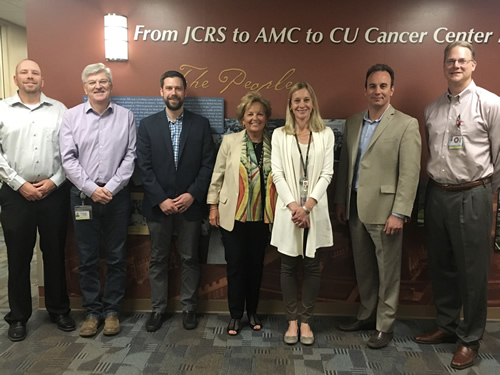
WINGS OF HOPE grant recipients with WINGS OF HOPE founder Maureen Shul and Dr. Karyn Goodman
In mid 2017, WINGS OF HOPE awarded three $50,000.00 grants to teams of researchers and physicians involved in pancreatic cancer research projects at the University of Colorado Cancer Center. One year later, WINGS OF HOPE board members received an update from the grant recipients on their projects. Most compelling was the amount of shared overlap in the three research projects, as well as the new pathways these projects led to. For a summary of the research projects awarded grants, please refer to article below.
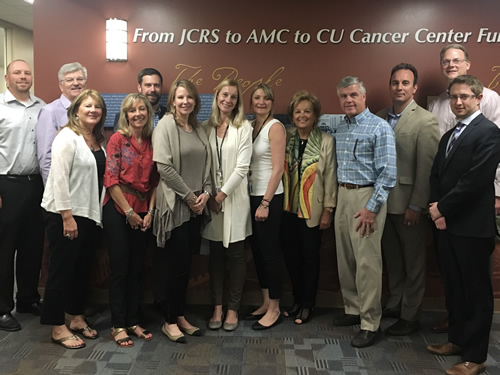
WINGS OF HOPE board members with grant recipients
November 2017
WINGS OF HOPE AWARDS THREE GRANTS FOR PANCREATIC CANCER RESEARCH
In July 2017, WINGS OF HOPE awarded three $50,000.00 grants for pancreatic cancer research at the University of Colorado Cancer Center. The grant recipients and summaries of their projects:
Aldehyde Dehydrogenase (ALDH) as a Potential Target in Pancreatic Cancer
Wells Messersmith, MD, and Macy Mingus
This project focuses on the ALDH enzyme family which shows potential for new drug targets. Pancreatic tumors with high levels of ALDH are associated with poorer patient prognosis. The investigators hypothesize that the ALDH-high subpopulation of tumor cells may be capable of regenerating whole tumors following chemotherapy, and thus may be responsible for the high recurrence rate of pancreatic tumors. In light of this correlation between ALDH-high tumor cells, chemoresistance and poor prognosis, the investigators propose to characterize the ALDH-high subpopulation. Characterization will help elucidate the role ALDHs play in pancreatic cancer and may help explain how ALDHs contribute to the behavior and chemoresistance of pancreatic cancer. The investigators also hope to evaluate the potential of ALDHs as drug targets to enhance the current efficacy of pancreatic cancer treatment.
Identification of Therapeutic Liabilities in the Mutant p53 Transcriptome
Joaquin Espinosa, PhD., Todd Pitts, PhD. and Kelly Sullivan, PhD.
This project focuses on answering questions about mutations in p53 that have been shown to drive the malignant properties of pancreatic cancer. While there have been exhaustive studies performed to characterize the transcriptional program controlled by p53 wild type, our understanding of the p53 transcriptional program is decidedly lacking. Using publicly available data sets as well as their own cell lines and patient derived xenograft models, the investigators will pursue answers to some very important tumor biology that has yet to be well researched. In doing so, the investigators will greatly increase our understanding of p53 signaling in pancreatic cancer and help to establish the feasibility of exploiting therapeutic liabilities generated by this prominent oncogene.
Patient Derived Tumor Organoids to Identify Effective Drug Combination Treatments for Pancreatic Cancer
Dan LaBarbera, PhD., Peter Dempsey, PhD. and Todd Pitts, PhD.
This project is directed at the development of a method to provide more efficient and effective ways to test targeted therapies that are under development for pancreatic cancer. The current method uses patient derived tumor xenograft models, but this method is time consuming and expensive. The investigators propose to develop a method that takes the tumors out of the mice and grows them in a three-dimensional organoid culture, which more appropriately mimics how tumors grow in patients. Then, using a panel of drugs available from the National Cancer Institute, the investigators will test combinations of anti-cancer compounds to determine the best possible combination strategy.
“WINGS OF HOPE is proud to award these three grants, which will enable these teams of researchers to think outside the box and take risks that would otherwise not be possible under larger grant guidelines,” stated WINGS OF HOPE founder Maureen Shul.
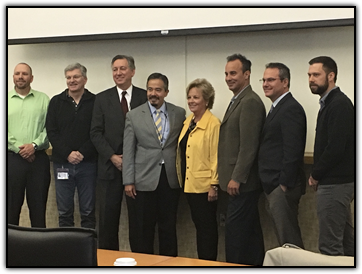
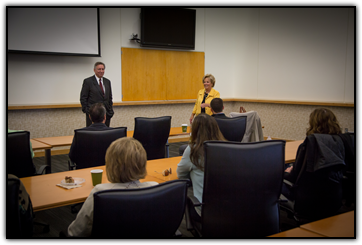
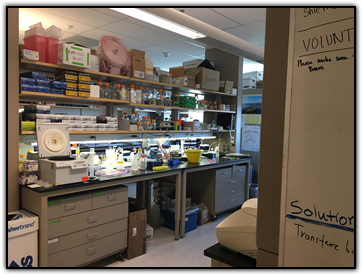
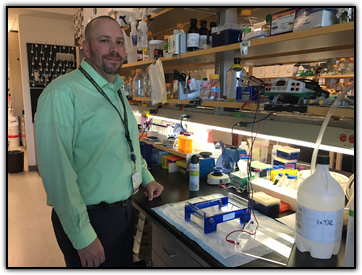
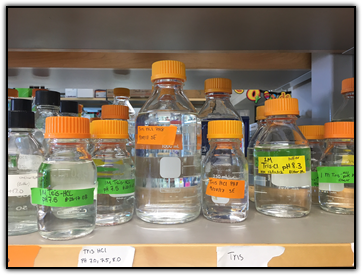
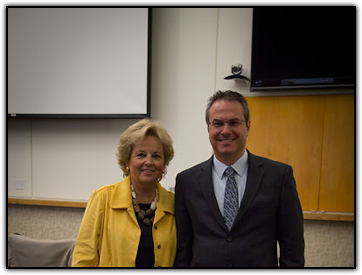
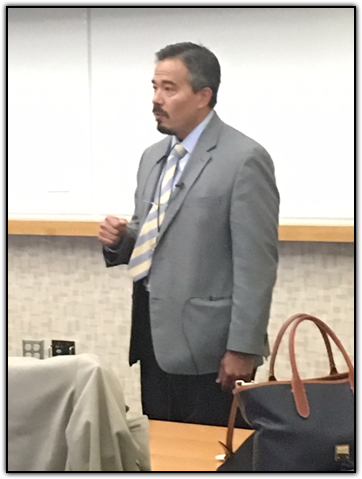
The Wings of Hope behind an everyday killer: Eradicating pancreatic cancer
Published: July 5, 2016
By Alex Ambrozic
Local nonprofit foundation is raising awareness and funding to fight a horrible disease
The disease that grows day by day
Cancer. It’s a word that touches people in a myriad of ways. To some it’s a word that carries heavy hearts, to others it forces determination and courage. Millions are affected by cancer every day, but a cancer that tends to be overlooked because of its deadliness and stealth, is actually the cancer we all need to pay attention to.
Pancreatic cancer is an aggressive form of cancer that develops in the tissues of the pancreas, located in the lower part of the stomach. The pancreas plays a big role in the digestion of the food we all eat by producing enzymes that help the body with digestion as well as producing hormones like insulin to help control blood sugar levels in the body.
Now, many doctors and researchers overlook pancreatic cancer for three main reasons. First, it isn’t the most common of cancers compared to others that currently affect a wider range of people, such as breast cancer or lung cancer. Second, it is extremely difficult to find in the early stages, so usually when it’s found it is too late. And third, the way the cancer spreads and mutates is much more complex compared to other cancers, making it trickier to study and research.
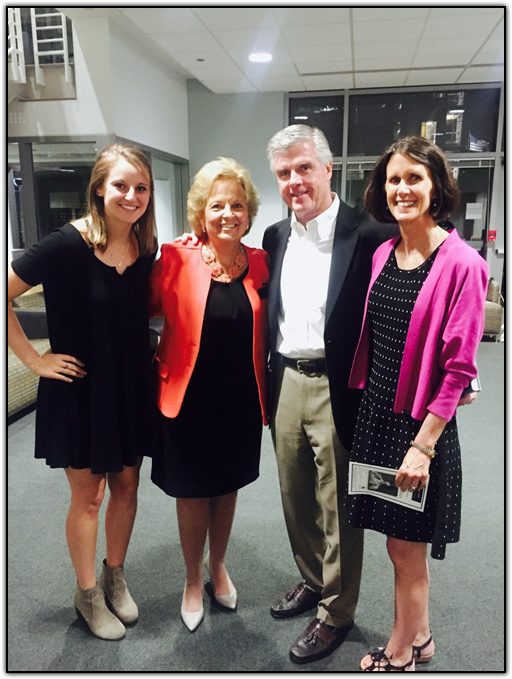
But, did you know?
Pancreatic Cancer is currently the third leading cause of cancer related deaths in the United States.
By 2020 pancreatic cancer will move to the second leading cause of cancer related deaths.
In 2016, approximately 53,000 people will be diagnosed with pancreatic cancer.
In 2016, 42,000 people will die from pancreatic cancer.
Of the patients diagnosed with pancreatic cancer, 85% are usually diagnosed when they are in the late stages of the disease (stage 3 or 4) and only 3% of those 85% will survive.
Surgery is the primary curable option to remove the cancer from the pancreas, but less than 20% of patients are candidates for the surgery
Pancreatic cancer is where breast cancer statistics and research were about 40 years ago.
The Wings of Hope Behind Pancreatic Cancer?
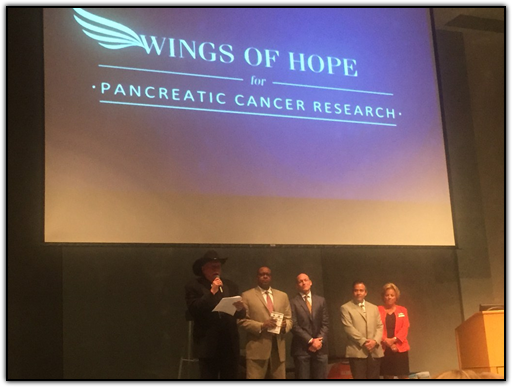
The biggest thing any of us can hope for eradicating any cancer is to support the research behind these diseases. For pancreatic cancer, the greatest importance is being able to detect the cancer early. In order to help find tools and means of early detection to save lives, there has to be an influx funding for research and this is where the foundation, Wings of Hope, swoops in.
Wings of Hope is a local nonprofit foundation, founded in 2012 by Maureen Shul, to help raise awareness and funding for pancreatic research. In 2013, Wings of Hope entered into a formal partnership with the University of Colorado Cancer Center whereby both entities collaborate efforts to raise awareness as well as funding for the pancreatic cancer research taking place at Anschutz Medical Campus. In 2015 Wings of Hope established the first endowment for pancreatic cancer research at the CU Cancer Center.
The University of Colorado Cancer Center has continued to rise in national standing in terms of its research with many of their physicians from John’s Hopkins. Five years ago the Medical Center wasn’t ranked nationally among other research centers and now it is number 15 and will continue to move up against other research facilities.
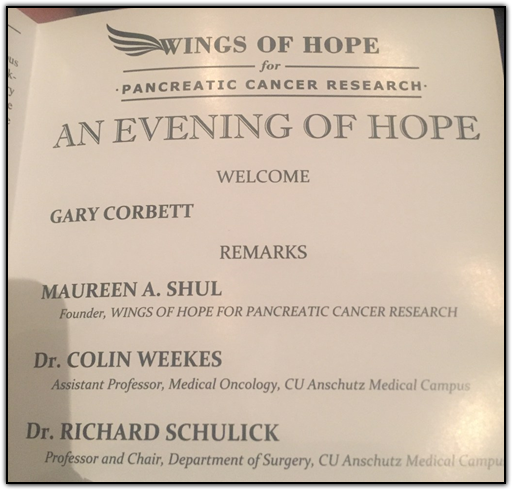
“I hear story after story from patients and their families how meaningful it ia to have doctors who care so thoroughly and deeply about their situation, care these heroic doctors give every single day,” said Maureen.
With the research at Anschutz Medical Campus, partnered with a local nonprofit like Wings of Hope, the two are moving forward and making a difference; giving families hope, where for many, there was none left.
You can Support Wings of Hope, too!
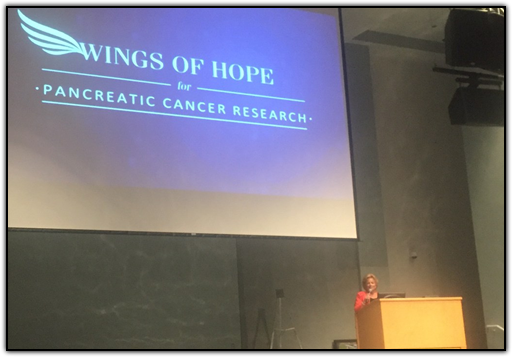
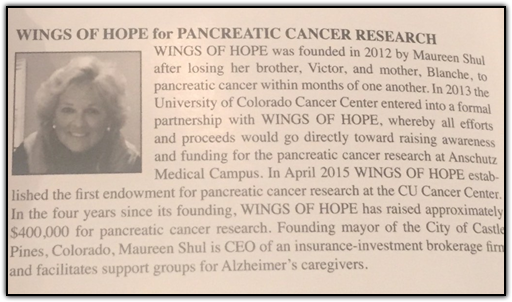
“I had no experience with or interest in ever starting a nonprofit, but was driven to do it out of grief over losing my brother and mother to pancreatic cancer within months of one another. These were profound loses, and I knew I could not continue without trying to give meaning and find purpose in all that was lost.”
When I met Maureen it was clear she had a passion for helping families who were struck by this disease and when she told me her reason for starting Wings of Hope, it was even more evident how determined she is to have her foundation make a difference.
Wings of Hope has events throughout the year inviting all and any who have been impacted by cancer or want to help people with it, whether that is pancreatic or not, and putting all money raised directly into pancreatic cancer research. To find out about events go check out their website at www.wingsofhopepcr.org!
“There are national organizations representing various medical conditions that do enormously great things, but as I reached out to these organizations, I knew that it was not for me. It was important for me to not only know where the donations were going, but to know how much was going into research, and I learned quickly that some organizations did not have research as their focus,” said Maureen.
All of Wings of Hope donations go towards one thing and one thing only and that is towards finding a cure!
Help Impact a Family who has had to face Cancer!
“The most motivating experiences I have had since starting Wings of Hope have centered around the people I have met. From the doctors, to the CU Cancer Center Staff, to others who have lost loved ones, to some of the most incredible and brave patients, all have given me an unforgettable and eye-opening experience just by their allowing me to be a part of their experiences.”
It doesn’t matter the family or person or the type of cancer, there is no doubt that cancer as a worldwide disease affects an incredibly large scale of people. These little organizations like Wings of Hope start from families who have been struck full force by heartbreak and sadness and yet they grow out of love and determination to make a difference. They spread by all of us taking the time to not only learn something about the disease, but learn something about someone who is being directly affected by it. It’s this crazy network of families that get connected and spread that hope further and further; all united in one cause.
Wings of Hope continues to help provide a way to find a cure for pancreatic cancer, uniting individuals and inspiring so many as it grows. Will you be part of the change? Maureen certainly encourages us to be.
“You do not realize the impact such small things you are doing have, but I learn all the time how much it matters to those who are in the midst of that journey, and that is all the inspiration I need.”
This Hospital Life: Cancer patient finds life is his canvas
Medical care from UCH providers and art provide inspiration to begin anew
Published: July 6, 2016
By Tyler Smith
UCHealth
Early in 2013, Arturo Garcia lay in a room at University of Colorado Hospital. A few weeks before, Garcia, then 38, had undergone surgery to remove a malignant tumor near his pancreas. Now he was battling what he described as a “nasty infection.” Weeks of grueling chemotherapy lay ahead – if he could survive the infection. Drains protruded from his body.
But that wasn’t the worst part. Garcia sat on his bed, his eyes closed. When he opened them, he saw…nothing.
“There was no floor,” he recalled, “only a huge abyss.” He drew up his legs and called for his wife, who had spent every night with him in the hospital, sleeping in a chair, sometimes using the wall as a pillow.
“What’s going on, Mama?” Garcia asked his wife. It’s only a bad dream, she told him.
But in one important way, it wasn’t. The abyss, Garcia realized, had presented a message that was terrifyingly real.
“I thought about how meaningless my life had been,” Garcia said.
He recounted the experience on a warm afternoon in early June. Thin but healthy and brightly engaged, he spoke with a visitor near an alleyway behind one of the galleries on Santa Fe Drive in Denver that displays his artwork – vividly colored paintings of famous figures, animals and landscapes. He sat astride a folding chair, his feet planted firmly on the ground.
After his brush with darkness in the hospital, Garcia said, he made a decision – one that saved his life just as surely as his surgery and chemotherapy.
“I had a deep internal dialogue,” he said. “I asked myself, ‘What feeds your soul?’ The answer was my art. I realized that every time in my life I have been depressed, I found refuge in art. I said to myself that whatever time I have left, I will do my art.”
Back from the brink
Garcia recovered from the infection, completed his cancer treatment and is now free of the disease. In appreciation for the lifesaving care he received from UCH and the University of Colorado Cancer Center, Garcia recently donated a pair of his paintings. The Cancer Center unveiled the paintings, now hanging in a conference room, during a reception May 26. One can appreciate Garcia’s art for its own sake, but on a deeper level it represents a much larger body of work: his life, defined by purpose.
Garcia’s drive for meaning was integral to his recovery, said Colin Weekes, MD, PhD, Garcia’s medical oncologist and a specialist in pancreatic cancer.
“We all have a defined life expectancy, but when one comes to an appreciation that the clock is ticking, it’s important to set goals for what you want your life to be,” Weekes said. “The transition for Arturo is that he realized he had taken his life for granted. He made a decision to live it differently and more actively. He put a different level of emphasis on his art.”
Just before his cancer diagnosis, Garcia was on a path that seemed to hold few prospects for new beginnings. He was a bartender at 3 Margaritas restaurant in Lakewood, a job he described as “a no-brainer.” He had left Mexico in 2008 following a divorce from his first wife and a recession that derailed his work selling real estate at Lake Chapala in Mexico, a popular community for U.S. and Canadian retirees. Neither of the jobs had provided much “fulfillment for the soul,” Garcia said.
On a Saturday night in December 2012, Garcia was less concerned with seeking fulfillment than with fighting abdominal pain that he said nearly paralyzed him. It was a busy night and at his boss’s request, Garcia battled through physical agony for another hour before going home, showering and then getting himself to the Emergency Department at UCH – he doesn’t remember how. He was admitted with a raging fever and was later diagnosed with an enlarged pancreas. An endoscopy procedure and pathology test showed he had a malignant tumor in the ampulla of Vatar, a small opening into the duodenum, the top part of the small intestine.
The tumor, about the size of a grape, prevented Garcia’s pancreatic and bile ducts from emptying their secretions through the ampulla of Vatar into the intestine, said Barish Edil, MD, associate professor of surgery and director of the Pancreas and Biliary Surgery Program at UCH. Ampullary cancer, which is rare, can be deadly, but in at least one respect, Garcia was lucky: his had not metastasized, Edil said. Garcia needed a surgical procedure known as the Whipple. It’s essentially a gastrointestinal replumbing that involves removing the tumor along with the head of the pancreas, the duodenum and the gallbladder, then sewing the bile duct into what remains of the intestine to allow it to empty its secretions. Edil, who arrived at UCH from Johns Hopkins in 2011, is an expert in the procedure.
“There is no alternative to the Whipple for this cancer,” Edil said. “We can’t cure it with chemo or radiation alone. Without it, the patient would have died.”
Edil called Garcia’s prognosis very good, but added that skillfully delivered clinical care does not alone guarantee a successful recovery.
“The passion to live is extremely important,” Edil said. “Arturo is grateful to be alive. He realized the magnitude of what he was up against. He found that passion and put his energy into what he now does as an artist.”
Old memories, new life
Following the surgery, Garcia was tested by the infection fight and the challenges of 12 rounds of chemotherapy. The experience, he said, opened doors for him in unexpected ways. After coming home from the hospital the second time, he got his art supplies out, but struggled to paint still-lifes and landscapes realistically. With time, he found that the past found its way into his work. Increasingly, the colors in his paintings harkened to those used by the Huichol Indians of Mexico who are indigenous to the area of Mexico where Lake Chapala sits. Garcia recalled as a boy seeing the colors – ultramarines, violets and magentas – in caves and on a small island in the lake. Images of deer, sun and water, sacred elements for the Huichols, also crept into his paintings and his consciousness.
“Something shifted inside and I began to look at life differently,” Garcia said. “It was a psychic change – a change in my soul.” He began using meditation as a form of self-healing and painted with commitment and determination. He completed two portraits in the new style, one of Abraham Lincoln and another of Che Guevara, then a flood of new work.
New dedication
Cancer opened other doors in unexpected ways. In 2012, Maureen Shul had formed Wings of Hope after pancreatic cancer took the lives of her brother and mother only months apart. Shul, a former mayor of Castle Pines and a business owner, had little experience with not-for-profits, but created Wings of Hope to raise money for pancreatic cancer research and to increase awareness of the disease. Well before they met, Shul’s motivations hewed closely to Garcia’s.
“I couldn’t go on without finding meaning or purpose,” Shul said in a phone interview. “I knew I had to honor their lives and give meaning to the horrible thing that had happened. In doing so, I met like-minded people.”
One of them turned out to be Weekes, whom she met through a mutual friend at a Pancreas Cancer Action Network meeting. After building a close relationship with Weekes and many of his colleagues, including physicians Richard Schulick, Tom Purcell and Wells Messersmith, Shul forged a formal partnership with the CU Cancer Center in 2013. Wings of Hope has since raised and donated more than $400,000 for research into the disease, and Weekes serves on its board of directors.
Unfinished business
Shul eventually connected with Garcia at a Wings of Hope event, and the two formed a strong bond and friendship. He’s a highly valued regular at the organization’s fundraisers and a source of inspiration for others facing deadly disease, Shul said.
“When a patient goes through what Arturo has gone through, there is a state of grief, hopelessness and confusion,” she said. The challenge for many patients, Shul added, is finding a way forward from “grieving the old way of life” and finding new purpose. She recalled him meeting at her request with a woman recently diagnosed with pancreatic cancer who was afraid of treatment.
“It was something to behold to see him share his experience and give her hope and a basis to fight,” Shul said.
Weekes and his colleagues share a similar commitment to meeting patients on their own terms and helping them face their disease with “an innate empathy and compassion,” Shul said.
It can be no other way with a disease like pancreatic cancer, which continues to exact an enormous toll in life and suffering, Weekes said. One-year survival rates are only about 20 percent, while five-year rates remain in single digits.
“People come to see me for opportunities for better outcomes, but almost all of them will die of cancer,” Weekes said. “We try to give people an opportunity to live life on their own terms and treat them with respect and let them know that we are here for them. Even if they won’t survive, they can live as best they can and with a positive lifestyle. We will be aggressive in therapy, but realistic, because it’s not just about treating the cancer. It’s about treating the whole patient.”
Arturo Garcia is acutely aware that he received a rare opportunity to begin life anew. He’s not going to waste it. He vows to continue using his paintbrush to complete the grand work that is his life.
“I am here for a purpose and that is to help others,” he said. “Art helps sick people. The very least that I can do is to try to give back what was given to me.”
--Tyler Smith.
Smith is a writer and editor for the UCHealth Insider. To comment on this article, contact him at tyler.smith@uchealth.org.
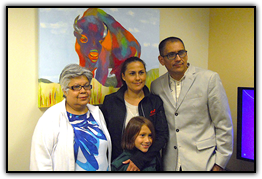
Arturo Garcia (far right) and his family with one of the paintings he donated to the Cancer Center during a reception May 26. Left to right: Garcia’s mother, Maria Torres; wife Erika Tejeda; son Arturito.

Garcia at a gallery on Santa Fe Drive in Denver where he displays and sells his work.

Garcia shows a print of a painting of Che Guevara that he completed at the start of his recovery from cancer.

Garcia’s interpretation of Abraham Lincoln reflects his return to the vivid colors of his early life.
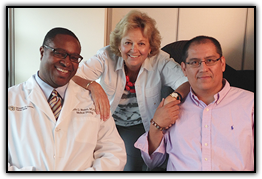
University of Colorado Cancer Center medical oncologist Colin Weekes, left, and Maureen Shul of Wings of Hope have played important roles in Garcia’s new life.
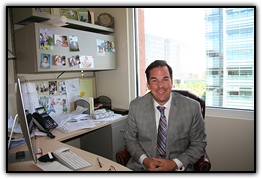
Barish Edil, MD, performed a lifesaving Whipple procedure on Garcia in 2012.
MAY 2016
WINGS OF HOPE was proud to join individuals representing 54 global pancreatic cancer organizations from 24 countries to raise unprecedented awareness for a disease with the lowest survival rate of any major cancer. The first World Pancreatic Cancer Coalition (WPCC) meeting was held in Orlando, Florida in conjunction with the American Association of Cancer Research conference. The WPCC's goal is to drive transformational change for those affected by pancreatic cancer.
Worldwide, pancreatic cancer is the 7th most common cause of cancer related death in men and women combined. Less than 10 % of those diagnosed worldwide survive 5 years.
"The goal is to find ways to work collaboratively in order to have a greater impact in raising awareness and moving the research forward," stated WINGS OF HOPE founder Maureen Shul.

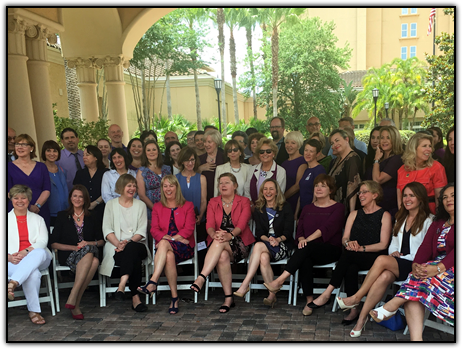
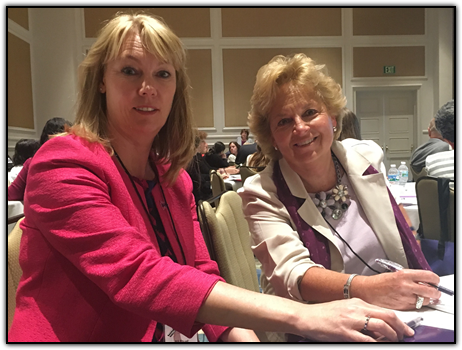

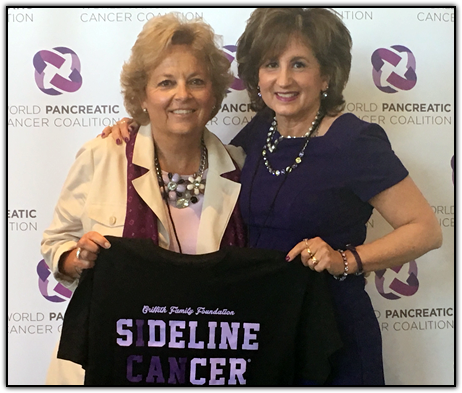
MAY 2016
For first time, Colorado directly funds cancer research
by Garth Sundem, CU Cancer Center
Colorado Gov. John Hickenlooper signed a bill giving approximately $1.7 million annually to University of Colorado Cancer Center for cancer research. The money will be allocated from tobacco litigation settlement money. This is the first time the state legislature has earmarked money specifically for cancer research.
“We have always thought of CU Cancer Center as Colorado’s Cancer Center,” said Dan Theodorescu, MD, PhD, CU Cancer Center director. “The additional research money will help us move cancer science forward and get the right treatments and interventions to the right patients at the right time.”
In 1998, Colorado signed the Master Tobacco Settlement Agreement awarding a total of $206 billion to counteract the health effects of tobacco use in the United States. To date, Colorado has received more than $1.5 billion of these monies. The bill signed today, House Bill 16-1408, allocates money from this fund to speed the pace of cancer research and other health related programs in the State of Colorado.
CU Cancer Center is the only comprehensive cancer center in the state of Colorado as designated by the National Cancer Institute. It also is part of several elite groups, including the National Comprehensive Cancer Network (NCCN) which establishes standards of care for cancer patients and guidelines for programs to improve quality of life for cancer survivors. CU Cancer Center is also a member of the Oncology Research Information Exchange Network (ORIEN). The partnership takes samples from patient tumors and pairs it with information describing their treatments and results. All while protecting patient privacy, the information is collected in a shared database so ORIEN-affiliated cancer researchers can draw conclusions based on many more patients than at their own institution, thus allowing studies would otherwise not be feasible.
With the signing of this bill, Colorado joins states including California, Illinois, Kansas, Texas, Nebraska, Arizona, Massachusetts and others that directly fund cancer research, the vast majority with similar tobacco tax and/or tobacco settlement monies.
“This money from the state legislature will help our efforts to discover targets for cancer treatment, develop medications for those targets and deliver the therapies to patients,” said Theodorescu. “Knowing we have the confidence of the state legislature and additional resources, we will be able to make a bigger impact on the fight against cancer for patients in Colorado and beyond.”
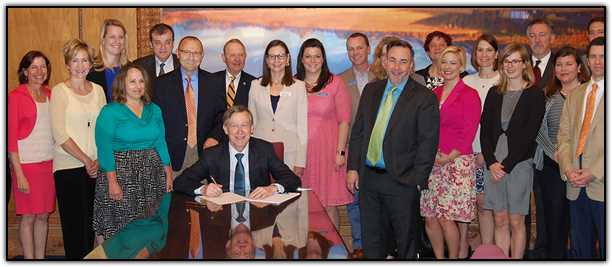
Colorado Gov. John Hickenlooper with CU Cancer Center Director, Dan Theodorescu, MD, PhD, CU School of Medicine Dean John J. Reilly, Jr., MD and others at the signing of Colorado House Bill 16-1408
APRIL 2016
WINGS OF HOPE presented $100,000.00 to the University of Colorado Cancer Center for pancreatic cancer research before a group of CU Cancer Center physicians, staff, WINGS OF HOPE board members, friends and supporters. The proceeds were the accumulation of donations collected in 2015 for this cause. WINGS OF HOPE founder and CEO Maureen Shul spoke on the growth of the foundation and the urgent need to move the research forward. Dr. Colin Weekes, Dr. Wells Messersmith and Dr. Richard Schulick each explained the various ways in which WINGS OF HOPE has made an impact in the ongoing pancreatic cancer research at Anschutz Medical Campus and how vital the funding is to take the research on one of the deadliest cancers to the next level. Special thanks to CU Fund staff Allison Krebs, Jerry Sinning and Brianna Gagnon for assisting with the presentation ceremony arrangements.
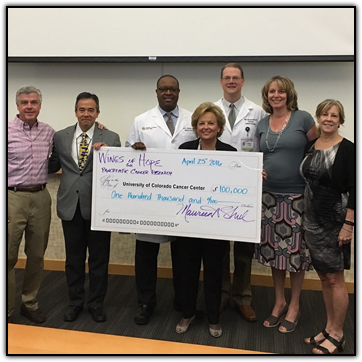
WINGS OF HOPE board member Jim Comerford,
Dr. Richard Schulick, Dr. Colin Weekes,
WOH founder Maureen Shul,
Dr. Wells Messersmith,
WOH board members Crystal Hodge and Stacy Ohlsson
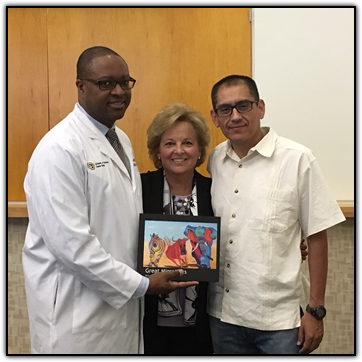
Dr. Colin Weekes, Maureen Shul, local artist
and pancreatic cancer survivor Arturo Garcia
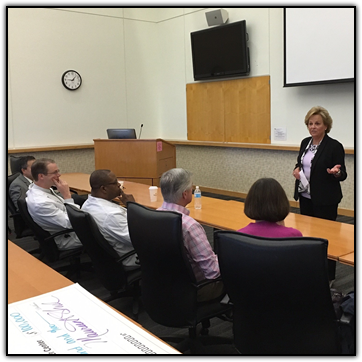
Opening remarks
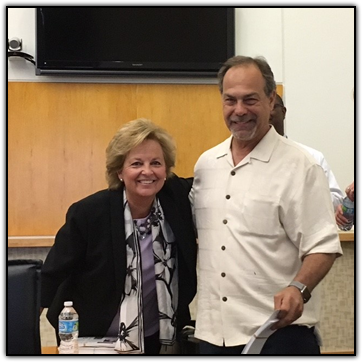
Maureen Shul and friend and supporter Chip Coppola
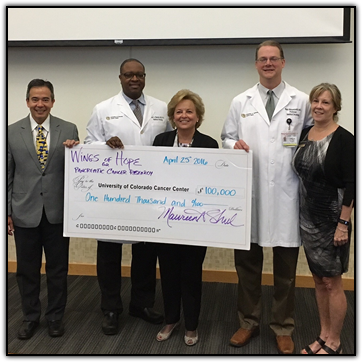
Dr. Richard Schulick, Dr. Colin Weekes,
Maureen Shul, Dr. Wells Messersmith and Stacy Ohlsson
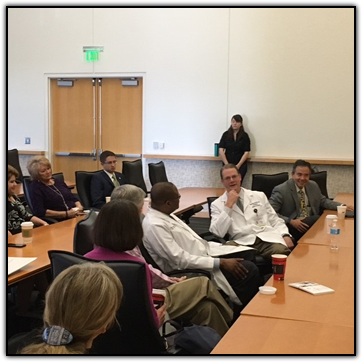
JANUARY 2016
Guest Commentary: Cancer "moonshot" is under way
By Dan Theodorescu
Friday, January 22, 2016

Vice President Joe Biden points at President Barack Obama during the president's State of the Union speech on Jan. 12. The Obama administration is launching what it calls a "moonshot" effort to cure cancer, with Biden taking the lead on the initiative. (Evan Vucci, Associated Press/Pool)
In his final State of the Union Address, President Obama announced that Vice President Joe Biden — who last year lost his son to brain cancer — would spearhead a "moonshot" to cure cancer.
At the University of Colorado Cancer Center, we already take part in research and data gathering to contribute to the vice president's mission. President Nixon declared war on cancer in 1971. We pictured researchers and doctors storming the beaches of the disease, putting an end to it. While this war led to inroads against cancer, it did not end it. We learned we are not fighting one fight, but many related fights.
Cancer is not one disease. Basic research into the biology of cancer shows us that each instance is a complex mix of genetics. One breast cancer may be caused by a tumor's ability to over-utilize the hormone estrogen to drive its growth; we have shown at the CU Cancer Center that other breast cancers may depend on receptors for the hormone androgen in much the same way. However, science spanning from experiments with cells in the laboratory to clinical trials with human patients have given us medicines like the drug tamoxifen to control estrogen-receptor-positive breast cancer and the drug enzalutamide to control androgen-receptor-positive breast cancer.
This work requires collaboration and support. Because we may be working with small percentages of patients, no single institution is likely to see enough patients with any subtype of cancer to draw meaningful conclusions about potential treatments. Just like the field of cancer research is working with innovative new strategies to target diseases, the field as a whole is evolving new ways to collaborate in order to test these treatments with populations large enough to demonstrate their effect.
The CU Cancer Center collaborates with 10 other major cancer research centers to share data in a partnership known as the Oncology Research Information Exchange Network (ORIEN). In this partnership, samples from patient tumors are paired with information describing their treatments and results. This information is collected in a shared database. Now cancer researchers within the ORIEN network can draw conclusions based on 11 times the number of patients. And to date, over 124,000 cancer patients have agreed to donate tumor samples that could show genetic abnormalities needed to match them with targeted clinical trials of new medicines that could control their form of the disease.
In 2014, Reps. Diana Degette, D-Colo., and Fred Upton, R-Mich., worked together on the 21st Century Cures Initiative to get new, effective treatments to the people who need them. This fact-finding initiative, in which I have been honored to participate, influenced the national adoption in 2015 of the Precision Medicine Initiative. With an initial budget of $215 million, this initiative "promises to accelerate biomedical discoveries and provide clinicians with new tools, knowledge, and therapies to select which treatments will work best for which patients," according to WhiteHouse.gov.
The United States has the world's most advanced infrastructure of cancer scientists and technology. This infrastructure of skill and tools is allowing us to pick apart the biology of cancer. We are creating a framework of collaboration and data sharing that lets us understand the effects of our medicines. Our representatives in government are recognizing the human and economic benefits of continuing to lead the world in biomedical research. We are poised to save lives; we are poised to control cancers in ever-increasing percentages of patients. The new, more nuanced approach in the field of cancer research is showing and will show results. Watching patients live longer, better lives is the most inspiring result of modern cancer research.
It's exciting to think this "moonshot" will generate the funding and public support needed to save even more lives.
Dan Theodorescu, M.D., is director of the University of Colorado Cancer Center.
JANUARY 2016
The American Cancer Society has just published its "Cancer Statistics, 2016 Report" in CA: A Cancer Journal for Clinicians. The report states pancreatic cancer deaths will surpass breast cancer deaths this year in the United States, becoming now the 3rd leading cause of cancer related deaths. The glimmer of hope in the report is that the 5-year relative survival rate for pancreatic cancer increased slightly from 7 to 8%. There is no more urgent time than now to support the research that will lead to early diagnostic methods, more effective treatments and ultimately a cure.

Read older news articles on the News Archive page
JOIN THE EFFORT…BE A PART OF THE POSSIBLE, BE THE HOPE.



